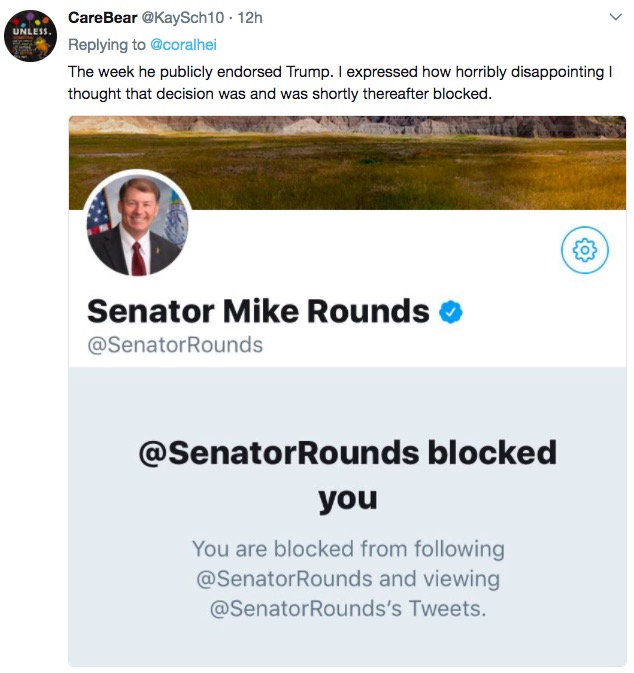Senator M. Michael Rounds has not blocked me from his Twitter account, but he has blocked a fellow South Dakota constituent:

If a federal court decision last week in Virginia applies, Senator Rounds’s blockage of a Twitter follower may violate the First Amendment.
Loudoun County Board of Supervisors chair Phyllis Randall maintained what she called a “county Facebook page” to receive public comment. Loudoun resident Brian C. Davison posted a comment about corruption on the county school board. Randall deleted the comment and blocked Davison for twelve hours. Davison sued, and Judge James C. Cacheris agreed that Randall had violated Davidson’s rights with viewpoint discrimination.
Judge Cacheris found that the Facebook page was a public forum, not a personal social media account:
…As in Rossignol, Defendant’s actions here “arose out of public, not personal, circumstances.” 316 F.3d at 524. The impetus for Defendant’s creation of the “Chair Phyllis J. Randall” Facebook page was, self-evidently, Defendant’s election to public office. She created the page in collaboration with her Chief of Staff the day before she took office, and did so for the purpose of addressing her new constituents…. Defendant then posted to her “Friends of Phyllis Randall” Facebook page, which she had employed during her campaign, and asked that her supporters “visit [her] County Facebook Page[,] Chair Phyllis J. Randall.”… The “Chair Phyllis J. Randall” Facebook page was born out of, and is inextricably linked to, the fact of Defendant’s public office.
Moreover, since creating the “Chair Phyllis J. Randall” Facebook page, Defendant has used it as a tool of governance. The page is, for example, one of two preferred means by which Defendant holds “back and forth constituent conversations.”… In that capacity the “Chair Phyllis J. Randall” Facebook page has, among other things, facilitated Defendant’s coordination of disaster relief efforts after a storm… and Defendant’s efforts to aid a constituent’s daughter seeking to study abroad…. Defendant has further used the page to solicit participation in the “Commission on Women and Girls” – an initiative Defendant runs out of her office…– and to promote and invite attendance at events related to her work as Chair…. And, most frequently, Defendant has used the page to keep her constituents abreast of her activities as Chair and of important events in local government [Judge James C. Cacheris, Memorandum of Decision, Davison v. Loudoun County Board of Supervisors, U.S. District Court, Eastern District of Virginia, 2017.07.25].
Since Randall operated her Facebook page “under color of state law,” the court found that in blocking Davison, Randall censored protected speech:
…When one creates a Facebook page, one generally opens a digital space for the exchange of ideas and information…. Defendant did so here, deliberately permitting public comment on her “Chair Phyllis J. Randall” Facebook page…. In practice, Defendant has allowed virtually unfettered discussion on that page…. Indeed, Defendant has affirmatively solicited comments from her constituents…. This sort of governmental “designation of a place or channel of communication for use by the public” is more than sufficient to create a forum for speech….
…If the Supreme Court’s First Amendment jurisprudence makes anything clear, it is that speech may not be disfavored by the government simply because it offends…. Here, as discussed above, Defendant acted in her governmental capacity. Defendant’s offense at Plaintiff’s views was therefore an illegitimate basis for her actions – particularly given that Plaintiff earned Defendant’s ire by criticizing the County government. Indeed, the suppression of critical commentary regarding elected officials is the quintessential form of viewpoint discrimination against which the First Amendment guards…. By prohibiting Plaintiff from participating in her online forum because she took offense at his claim that her colleagues in the County [Cacheris, 2017.07.25].
Senator Rounds created his verified Twitter account in January 2015, when he took office in the U.S. Senate. @SenatorRounds is the second social media link listed on Senator Rounds’s official U.S. Senate website. This Twitter feed includes numerous updates on official action in the Senate and its committees, plus photos of constituents who visit the Senator in his official capacity in Washington and occasional warm fuzzies to the folks back home. @SenatorRounds looks very much like a social media account that would not exist absent Mike Rounds’s official government position. The logic of Davison v. Loudoun would lead us to conclude that blocking Twitter users from @SenatorRounds based on offense or disagreement with political positions (like the endorsement of Donald Trump for President) is unconstitutional.
Davison v. Loudoun has obvious implications for complaints and lawsuits against Donald Trump for blocking Americans from following his overheated Twitter account. Trump’s Tweeting predates his occupation of public office by almost eight years; however, as Vox notes, his use of that account for public purposes like announcing the firing of his chief of staff and declaring a ban on transgender soldiers will make it easier for users he has blocked to prevail in legal action against him.